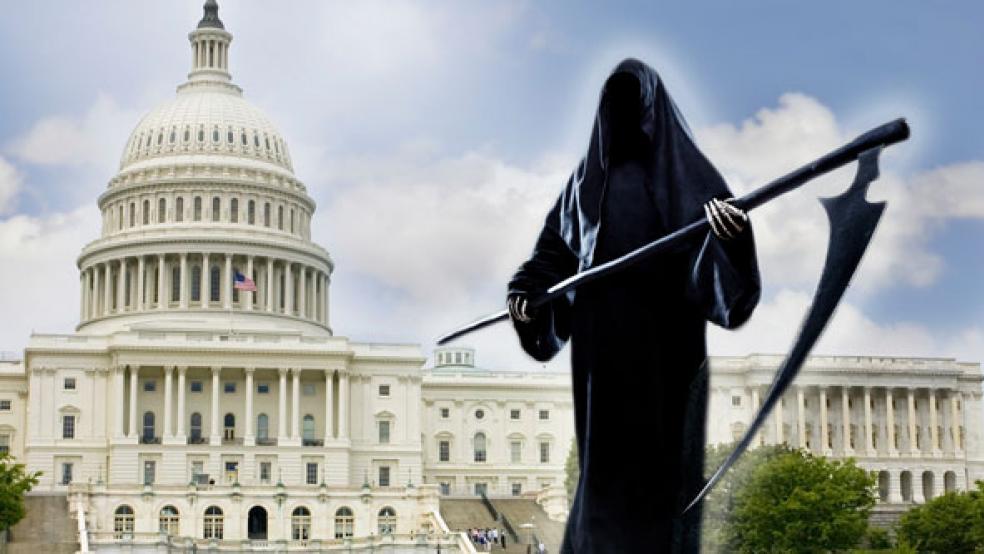Elon Musk and Vivek Ramaswamy, the wealthy duo selected by President-elect Donald Trump to lead an effort to dramatically reduce the size and scope of government, say they plan to eliminate thousands of federal regulations and slash jobs across the federal bureaucracy once the new administration takes power.
In an opinion piece published Wednesday in The Wall Street Journal, the billionaire entrepreneurs said Trump’s new “Department of Government Efficiency,” known as DOGE, will focus on three things: “regulatory rescissions, administrative reductions and cost savings.” These changes will come largely through executive action, according to the DOGE chiefs, reducing if not eliminating the need for Congress to pass new legislation to accomplish their goals.
Slashing regulations and headcount: The duo cited recent Supreme Court decisions — including Loper Bright v. Raimondo, in which the court overturned the Chevron doctrine that gave federal agencies wide-ranging authority to create new regulations — in support of their view that the president now has broad authority to eliminate federal rules and regulations. Under this theory, the executive can “immediately pause the enforcement of those regulations and initiate the process for review and rescission,” clearing the way to slash the regulatory state.
A significant reduction in regulations would go hand in hand with “mass head-count reductions,” including steep cuts at the regulatory agencies. Working with “embedded appointees” throughout the government, DOGE will determine the minimum number of people necessary to perform whatever mandated functions remain. Unneeded employees will be given assistance to “support their transition into the private sector” or early retirement.
Many federal workers are protected by civil service rules, but Musk and Ramaswamy argue that those rules only provide protection from abuses like political retaliation. The reductions DOGE envisions would be based on functional requirements, not politics, empowering the president to make extensive reductions in the payroll.
Musk and Ramaswamy identify another way to trim federal employment: bringing workers back to the office. “Requiring federal employees to come to the office five days a week would result in a wave of voluntary terminations that we welcome,” they write. “If federal employees don’t want to show up, American taxpayers shouldn’t pay them for the Covid-era privilege of staying home.”
Slashing spending: Musk and Ramaswamy said they intend to target the roughly $500 billion in annual spending that is technically unauthorized, since lawmakers failed to formally reauthorize it. Additionally, the DOGE duo said the 1974 Impoundment Control Act, which prevents the president from withholding payments authorized by Congress, could be unconstitutional — a position the conservative majority in the Supreme Court may support, potentially providing Trump with another tool to cut spending.
A voluntary effort: The DOGE chiefs also shed some light on how they plan to go about their work. Operating as volunteers who remain outside the formal structure of government, the duo will provide advice to the Office of Management and Budget and help build “a lean team of small-government crusaders” that works inside the Trump administration. The DOGE account on social media had posted last week in search of “super high-IQ small-government revolutionaries willing to work 80+ hours per week on unglamorous cost-cutting.” Musk added that “this will be tedious work, make lots of enemies & compensation is zero.”
The executive will provide the authority and orders to make the cuts that are identified by the DOGE team.
Preparing for pushback: Musk and Ramaswamy have laid out an argument for how DOGE can achieve a historical reduction in government spending, employment and regulation, but federal employees are reportedly lining up legal help to push back against the effort, and it’s not clear that Congress will be willing to play along with the shift in power to the executive, even with complete Republican control in Washington. Sharp reductions in spending and employment could face a host of practical and political challenges and raise a host of legal issues, not least of which is the constitutional role of Congress in controlling the power of the purse.
Steve Lenkart, the executive director of the National Federation of Federal Employees, told Reuters that DOGE is “going to come up against congressional mandates and come up against the Constitution, and it's going to set off this [debate about] who has the right to spend money on behalf of the American people.”




